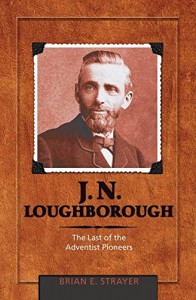Currently reading
J. N. Loughborough: The Last of the Adventist Pioneers

An Advent preacher when he joined the embryonic Seventh-day Adventist movement in 1852, John Norton Loughborough would spend the next 72 years as a preacher and administrator before being the last of the pioneers to pass leaving lasting legacy to the denomination only behind Joseph Bates and the Whites. Brian E. Strayer’s J. N. Loughborough: The Last of the Adventist Pioneers is the first major biography of influential preacher, missionary, and Church historian that was a little man who cast a long shadow.
Strayer begins with an impressive family history that gives background not only to Loughborough but how he was raised, including the influence his grandfather had on his spiritual life, and how in his youth he was influenced by the Millerite message. Loughborough’s resulting spiritual wandering in the years after the Disappointment before deciding to become a “boy preacher” at age 17 among the Advent Christians then his introduction to Seventh-day movement and later conversion to Sabbath were give significant time as well. Yet 85% of the book took up Loughborough’s 72 years among the Seventh-day Adventist movement covering his time as a preacher, president of numerous conferences, missionary to fields both domestic and foreign, and finally Church historian who was the last link to the “early days” for 3rd- and 4th-generation Adventists in the late 1910s and 1920s. Throughout Loughborough’s relationships with other important and influential denominational leaders was examined including Ellen White whose admonishments were welcomed by Loughborough in contrast to other Adventist leaders some of whom would later leave and attack not only the denomination and White. Strayer covered in detail Loughborough’s fight against apostacy and his role as the first Church “historian” as well has the lasting influence he had in both areas among Adventists.
Given the place in denominational history that Loughborough, Strayer used a wide range of sources to give a thorough look at his subject including what surviving letters he could find (Loughborough burned his own) and Loughborough’s own diaries (that was saved by a nurse instead of destroyed upon his death). Unlike the only other biography of Loughborough that followed the subject’s own apologetic look at Adventist history, Strayer brought a critical eye to his subject including Loughborough’s Church history books that influenced Adventist historiography for half a century.
- J. N. Loughborough is a well-written, well-researched look at the last pioneer of the Seventh-day Adventist movement. Brian Strayer showed the large footprint and long shadow this “little man” had had until this very day. This is a highly recommended biography for anyone interested in Adventist history.





